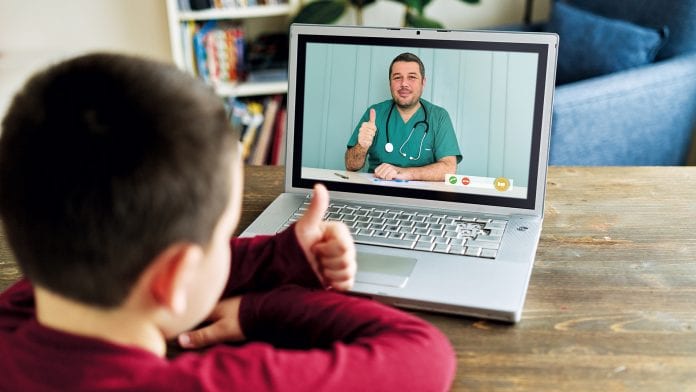
Remote consultation may be the key to mental health treatment for young people.
The National University Hospital of Iceland (Landspítali) has adopted Kara Connect’s online consultation programme, which enables secure remote telehealth connections, in order to continue the treatment of children and young adults through the lockdown restrictions necessitated by the COVID-19 pandemic.
Guðrún J Benediktsdóttir, an occupational therapist in Landspítali’s Department of Child and Adolescent Psychiatry (BUGL) who was instrumental in onboarding the technology within the department, speaks to HEQ about the need for technological innovation in medicine during lockdown.
Have the quarantine and isolation resulting from the COVID-19 pandemic had a substantial impact on young people? Have you found they are more severely affected than adults?
It comes as no surprise that the pandemic has had a profound impact on the mental health of children and adolescents. These effects have been well documented and new studies are being conducted all over the world in the hopes of presenting data pertaining to the exact effects that it has had.
It is difficult to say whether young people have been affected differently to adults, but we continue to work hard to monitor and help the children and adolescents that we see here at Landspítali to mitigate the negative impacts that the pandemic has had on mental health.
Have you experienced any technical challenges in implementing remote consultation technologies in a clinical setting? How receptive have clinicians been to the new system?
Thankfully, most of the issues we have experienced came before we actually implemented a remote solution. As a result of the pandemic, the hospital’s decision makers and key staff weren’t able to meet in person in order to discuss implementing new solutions, which was a big barrier for us as having a secure video solution implemented quickly was a top priority. Likewise, the Medical Director of Health, who is responsible for approving any new technologies we implement, is – as you would expect – not willing to accept subpar solutions, which is why we had to ensure that we were presenting the best possible options.
Thankfully, he agreed to Kara Connect, which, having been successfully implemented, has become very popular with the staff and clients that we have onboarded thus far, in order to orchestrate and continue the provision of one-to-one support.
Being able to utilise video conferencing technology, in the form of Kara Connect, has proved a far more effective way of reaching young people and their parents than by phone, for example, and has enabled staff to better monitor mental wellbeing during quarantine. We look forward to the possibility of Kara Connect accommodating group sessions in the future which will help us provide an expanded range of remote services to our clients.
Have digital technology and innovation played a significant role in Iceland’s response to the pandemic overall?
As is the case all over the world, Iceland has had to adapt quickly. Most workplaces and schools have, to some degree, implemented new digital strategies to great success. From our point of view, implementing a solution like Kara Connect has proved invaluable in supplementing the hard work our team does with children and adolescents with mental health difficulties. Without these solutions in place, it is safe to say that we would be in a very different position these many months later; and the same would be true for a lot of Iceland’s healthcare facilities.
Do you expect the issue of mental health to become more prominent in the healthcare sector in the wake of the pandemic? Could telehealth and remote treatment be more widely deployed to address this?
In my opinion, the prominence of mental health issues will likely remain at a similar level to pre-pandemic times. However, the number of people being treated for their existing concerns is likely to go up as a result of the increased adoption of telemedicine solutions. Sometimes, people’s reluctance to seek help correlates with a disinterest, or lack of capability, to actively leave the house and attend appointments. Telemedicine takes away this barrier for many people and will likely act as a catalyst – particularly for children and adolescents, who cannot drive, live in rural areas, or even abroad, to attend more appointments.
Dr Guðrún J Benediktsdóttir
Occupational Therapist
Department of Child and Adolescent Psychiatry
National University Hospital of Iceland
https://karaconnect.com
This article is from issue 14 of Health Europa. Click here to get your free subscription today.







